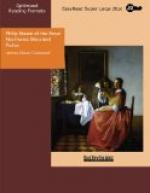“I can’t do that,” said DeBar unhesitatingly, “but I have hit a wolf twice out of five shots. It’ll be a quick, easy way, and we’ll settle it with our revolvers. Going to shoot to kill?”
“No, if I can help it. In the excitement a shot may kill, but I want to take you back alive, so I’ll wing you once or twice first.”
“I always shoot to kill,” replied DeBar, without lifting his head. “Any word you’d like to have sent home, Phil?”
In the other’s silence DeBar looked up.
“I mean it,” he said, in a low earnest voice. “Even from your point of view it might happen, Phil, and you’ve got friends somewhere. It anything should happen to me you’ll find a letter in my pocket. I want you to write to—to her—an’ tell her I died in—an accident. Will you?”
“Yes,” replied Philip. “As for me, you’ll find addresses in my pocket, too. Let’s shake!”
Over the stove they gripped hands.
“My eyes hurt,” said DeBar. “It’s the snow and wind, I guess. Do you mind a little sleep—after we eat? I haven’t slept a wink in three days and nights.”
“Sleep until you’re ready,” urged Philip. “I don’t want to fight bad eyes.”
They ate, mostly in silence, and when the meal was done Philip carefully cleaned his revolver and oiled it with bear grease, which he found in a bottle on the shelf.
DeBar watched him as he wiped his weapon and saw that Philip lubricated each of the five cartridges which he put in the chamber.
Afterward they smoked.
Then DeBar stretched himself out in one of the two bunks, and his heavy breathing soon gave evidence that he was sleeping.
For a time Philip sat beside the stove, his eyes upon the inanimate form of the outlaw. Drowsiness overcame him then, and he rolled into the other bunk. He was awakened several hours later by DeBar, who was filling the stove with wood.
“How’s the eyes?” he asked, sitting up.
“Good,” said the other. “Glad you’re awake. The light will be bad inside of an hour.”
He was rubbing and warming his hands, and Philip came to the opposite side of the stove and rubbed and warmed his hands. For some reason he found it difficult to look at DeBar, and he knew that DeBar was not looking at him.
It was the outlaw who broke the suspense.
“I’ve been outside,” he said in a low voice. “There’s an open in front of the cabin, just a hundred paces across. It wouldn’t be a bad idea for us to stand at opposite sides of the open and at a given signal approach, firing as we want to.”
“Couldn’t be better,” exclaimed Philip briskly, turning to pull his revolver from its holster.
DeBar watched him with tensely anxious eyes as he broke the breech, looked at the shining circle of cartridges, and closed it again.
Without a word he went to the door, opened it, and with his pistol arm trailing at his side, strode off to the right. For a moment Philip stood looking after him, a queer lump in his throat. He would have liked to shake hands, and yet at the same time he was glad that DeBar had gone in this way. He turned to the left—and saw at a glance that the outlaw had given him the best light. DeBar was facing him when he reached his ground.




